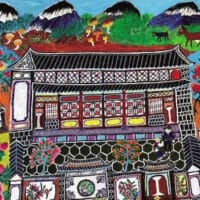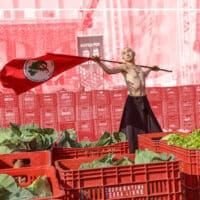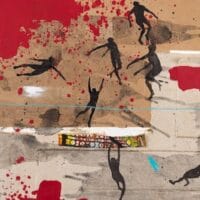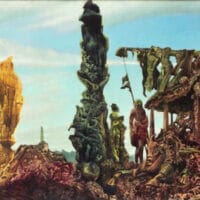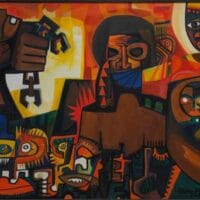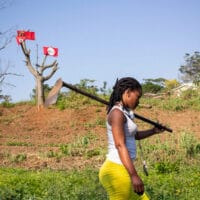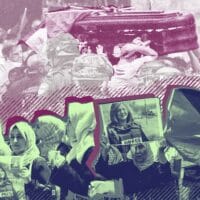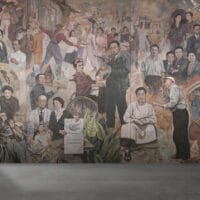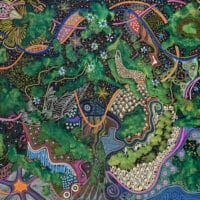-
Can we please have an adult conversation about China?
As the U.S. legislative leader Nancy Pelosi swept into Taipei, people around the world held their breath.
-
Sri Lankans seek a World in which they can find laughter together: The Thirty-First Newsletter (2022)
On 9 July 2022, remarkable images floated across social media from Colombo, Sri Lanka’s capital. Thousands of people rushed into the presidential palace and chased out former President Gotabaya Rajapaksa, forcing him to flee to Singapore.
-
All that I ask is that you fight for peace today: The Thirtieth Newsletter (2022)
Gas shipments through the Nord Stream 1 pipeline, which runs from Russia to Germany, were reduced to 40% of capacity in June, a cut that Moscow said was due to delays in the servicing of a turbine by the German firm Siemens.
-
It is dark, but I sing because the morning will come: The Twenty-Ninth Newsletter (2022)
In the chilly Brazilian winter of 2019, Renata Porto Bugni (deputy director of Tricontinental: Institute for Social Research), André Cardoso (coordinator of our office in Brazil), and I went to the Lula Livre (‘Free Lula’) camp in Curitiba, set up just across the road from the penitentiary where former President Luiz Inácio Lula da Silva sat in a 15-square metre cell.
-
Will our children be literate? Will they look forward to the future with dignity?: The Twenty-Eighth Newsletter (2022)
The world is adrift in the tides of hunger and desolation. It is difficult to think about education, or anything else, when your children are not able to eat.
-
The United States wants to prevent a historical fact–Eurasian integration: The Twenty-Seventh Newsletter (2022)
Over the course of the past fifteen years, European countries have found themselves with both great opportunities to seize and complex choices to make. Unsustainable reliance on the United States for trade and investment, as well as the curious distraction of Brexit, led to the steady integration of European countries with Russian energy markets and more uptake of Chinese investment opportunities and its manufacturing prowess.
-
There are hungry people. There are hungry people: The Twenty-Sixth Newsletter (2022)
The United Nations International Children’s Emergency Fund (UNICEF) reports that, every minute, a child is pushed into hunger in fifteen countries most ravaged by the global food crisis.
-
The lethality of Washington’s Global Monroe Doctrine: The Twenty-Fourth Newsletter (2022)
This past week, as part of its policy to dominate the American hemisphere, the United States government organised the 9th Summit of the Americas in Los Angeles. U.S. President Joe Biden made it clear early on that three countries in the hemisphere (Cuba, Nicaragua, and Venezuela) would not be invited to the event, claiming that they are not democracies.
-
Land in South Africa shall be shared among those who work it: The Twenty-Third Newsletter (2022)
In March 2022, United Nations (UN) Secretary-General António Guterres warned of a ‘hurricane of hunger’ due to the war in Ukraine. Forty-five developing countries, most of them on the African continent, he said, ‘import at least a third of their wheat from Ukraine or Russia, with 18 of those import[ing] at least 50 percent’.
-
Africa, the collateral victim of a distant conflict: The Twenty-Second Newsletter (2022)
Debt hangs over the African continent like a wake of vultures. Most African countries have interest bills that are much higher than their national revenues, with budgets managed through austerity and driven by deep cuts in government employment as well as the education and health care sectors.
-
And then there was no more Empire all of a sudden: The Twenty-First Newsletter (2022)
U.S. President Joe Biden is to host the Summit of the Americas in June, where he hopes to deepen Washington’s hegemony over the Americas.
-
Art is a dream in which we imagine our future: The Twentieth Newsletter (2022)
On 11 May 2022, an Israeli sniper fired at the head of the veteran Palestinian journalist Shireen Abu Aqleh as she reported on an Israeli military raid on a refugee settlement in Jenin (part of the Occupied Palestine Territories).
-
In a world of great disorder and extravagant lies, we look for compassion: The Nineteenth Newsletter (2022)
These are deeply upsetting times. The COVID-19 global pandemic had the potential to bring people together, to strengthen global institutions such as the World Health Organisation (WHO), and to galvanise new faith in public action.
-
With clenched fists, they spend money on weapons as the Planet burns: The Eighteenth Newsletter (2022)
Two important reports were released last month, neither getting the kind of attention they deserve. On 4 April, the Intergovernmental Panel on Climate Change’s Working Group III report was published, evoking a strong reaction from the United Nations’ Secretary General António Guterres.
-
I cannot live on tomorrow’s bread: The Seventeenth Newsletter (2022)
On April 19, the International Monetary Fund (IMF) released its annual World Economic Outlook, which forecasted a severe slowdown in global growth along with soaring prices. ‘For 2022, inflation is projected at 5.7 percent in advanced economies and 8.7 percent in emerging market and developing economies–1.8 and 2.8 percentage points higher than projected in… January.’
-
These dark times are also filled with light: The Sixteenth Newsletter (2022)
In early March, Argentina’s government came to an agreement with the International Monetary Fund (IMF) on a $45 billion deal to shore up its shaky finances. This deal was motivated by the government’s need to pay a $2.8 billion instalment on a $57 billion IMF stand-by loan taken out under former President Mauricio Macri in 2018.
-
We do not want a divided planet; we want a World without walls: The Fifteenth Newsletter (2022)
While the United States began its illegal war against Iraq in 2003, Cuba’s President Fidel Castro spoke in Buenos Aires, Argentina. ‘Our country does not drop bombs on other peoples’, he said, ‘nor does it send thousands of planes to bomb cities … Our country’s tens of thousands of scientists and doctors have been educated on the idea of saving lives’.
-
This is not the age of certainty. We are in the time of contradictions: The Fourteenth Newsletter (2022)
It is hard to fathom the depths of our time, the terrible wars, and the confounding information that whizzes by without much wisdom. Certainties that flood the airwaves and the internet are easy to come by, but are they derived from an honest assessment of the war in Ukraine and the sanctions against Russian banks (part of a broader United States sanctions policy that now afflicts approximately thirty countries)?
-
History rounds off skeletons to zero: The Thirteenth Newsletter (2022)
On 16 March 2022, as Russia’s war on Ukraine entered its second month, Kazakhstan’s President Kassym-Jomart Tokayev warned his people that ‘uncertainty and turbulence in the world markets are growing, and production and trade chains are collapsing’.
-
In the World, there are many traps, and it is necessary to shatter them: The Twelfth Newsletter (2022)
On 31 March 1964, the Brazilian military initiated a coup d’état against the democratically-elected progressive government of President João Goulart.

